Episodes
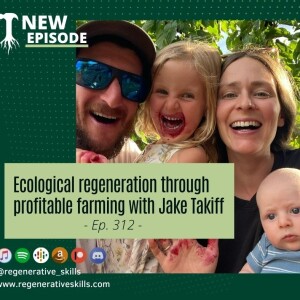
Friday Sep 29, 2023
Friday Sep 29, 2023
Any of you who’ve been following the show this season will remember one of my favorite episodes from the beginning of the year in which I documented a water restoration job I went out to Nicaragua to go in collaboration with Restoration Agriculture Development, the contracting company founded by Mark Shepard.
There I worked under the guidance of Jake Takiff, RAD’s dryland restoration specialist and the lead designer on that job.
I got along famously with Jake and learned a ton from working alongside him on that project. So much of his personal journey and the story of the development of his own farm and restoration design in Western Colorado didn’t make it into the episode we recorded back then, but I knew I would need to follow up and share his story with all of you.
Well we were finally able to find time and make our long overdue catch up call happen.
So let’s start with a little intro to set the context.
Jake and his wife Meghan started Cedar Springs Farm back in 2016 on the Western Slope of Colorado where they’ve built a home and now have two children.
They are focused on building soil, fostering biodiversity and managing water. The project utilizes scaled up permaculture techniques and regenerative farming practices including silvopasture, rotational grazing and agroforestry.
The management practices have transformed the landscape from an arid, high desert into a lush system of pastures with trees and yield high quality beef and pork.
Jake also hustles as a project coordinator, consultant and field manager for Restoration Agriculture Development through which he’s had the opportunity to design and install regenerative systems for farmers all over the world.
His experience on his own farm, combined with the many installations he’s managed for clients gives him a unique perspective and approach to the regenerative farming movement.
In this conversation we’re going to unpack that approach piece by piece. We start with a little background into his first experiences in farming and the elements that clicked and have stayed with him his whole life.
We go into the key connections and learnings that have informed his growth and capabilities as a farmer and land manager, as well as the mentors that have shaped his path.
Jake shares the details of his design approach to his own farm and how the patterns of the various ecosystems where he’s farmed have helped to inform him about the hydrology, plant communities, animal communities and the essential relationship between all of them that have come together to make his medium sized farm work so well.
We also dissect some of the specifics of the experiments he’s run over the last 7 years, those that have worked, and those that haven’t, and contributed to the evolving transformation of the land that continues to get better and better.
In general I’m a big admirer of people who have come to develop such a close and observant relationship with the land and living beings of the places they inhabit, and Jake is an exceptional example of someone who has centered his life around a deep connection to all the diverse and nuanced elements of his ecosystem from the natural ecology, his own family and local community, and even the complexities of the economy and socioeconomic realities that they participate in.
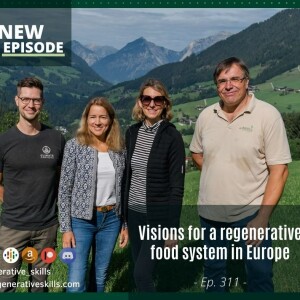
Friday Sep 22, 2023
Friday Sep 22, 2023
At the end of August I had a unique opportunity to attend the European Alpbach Forum in Austria, as I was invited by organizers at Nestlé to moderate an event they were organizing. This was a unique session that included a guided hike in the Alps around the town and a discussion centered on the core themes of which structures, innovation, incentives, models, and mindsets are necessary to enable the transition to regenerative food systems.
As listeners of this show already know, I’ve explored these concepts a lot in the past but mainly from a farmer and land steward perspective, only a few times exploring the wider industry that processes, distributes, and markets the end products that most people buy. So I was curious to understand how some of the biggest food companies globally and in Europe see the concept of regenerative food systems and their roles and responsibilities within them.
The event included three speakers, Katja Seidenschnur (the sustainability director at Nestle), Ulrike Middelhoff (Group sustainability manager at Agrana which is a large processor of food ingredients like sugar and starch), and Hans Gnauer (farmer and deputy chairman at Boden Leben, which roughly translates to Living Soil, a conservation ag consulting and education company). Together they represent perspectives from different sized food processing companies and the supply chain from field to final product.
Since we knew we wouldn't be able to record the event itself, The night before, we got together for dinner in the little town of Reith in Tirol and recorded this conversation in a cozy little restaurant. In this case cozy also means that the old wooden benches were quite creaky and that's the sound in the background which I'm not enough of a sound engineer to have removed completely. Oh well. In this conversation with the three of them we started by talking about each of their visions for a regenerative food system and what actions and resources they think are needed to make them a reality. I picked apart a few of the answers to get beyond the easy proposals and challenge a few of the assumptions beyond them. We also go into the roadblocks and challenges that are holding these ideas back and the responsibilities that each of them and their representative companies or communities have in transforming the current food system to one that goes even beyond sustainability. I’m really glad to have had the chance to get to know each of the speakers during our event and it gave me some valuable insights into the paradigm and thought process behind each of these representative members of the food system that has changed so much of how we eat and experience food in recent decades. I really hope to continue to participate in conversations like this and help to shape the dialogue and priorities that these companies base their policies and practices on. If any of you out there would like to hear me explore any particular topic or perspective from other aspects of the food industry, you can join the conversation and make requests on our Discord community which you can sign up for for free on our website at regenerativeskills.com.
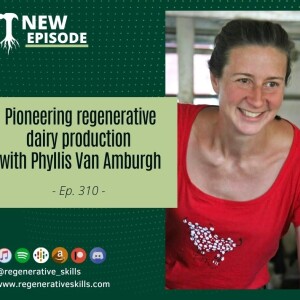
Friday Sep 15, 2023
Friday Sep 15, 2023
At this point I’ve covered a wide array of practices and management styles that fall under the broad umbrella of regenerative agriculture. Some could be considered traditional while others are more modern and innovative and they span continents, climates, biomes and industries. Nonetheless I’ve noticed a pretty big gap that I’ve yet to cover in detail that I hope to begin to fill in today.
Dairy farming has been under sharp criticism in recent times. Scrutiny over everything from the appropriateness of dairy in the diet to the methane emissions of cows and the controversial practices of early separation of calves from their mothers to maximize milk production have all contributed to a diminished reputation.
Though these critiques are very legitimate, what if there were solutions to all of them without the need to turn to non-dairy alternatives?
Today to explore these solutions is one of the leaders in regenerative dairy and a growing movement of dairy producers working to develop a new way of managing dairy cows and the pastures they coexist with. Phyllis Van Amburgh along with her husband Paul and their family are leaders in holistic land use, biodiverse cultivation, Organic dairy herd management, and more.
Together they are dairy farmers in upstate New York, and have been involved in key innovations in the dairy industry, mostly in western parts of the world, re-integrating dairy cows as a cornerstone for ecological health and for human communities to thrive. Phyllis and Paul have also helped develop the Grass-fed certification program with NOFA-NY and PCO.
In this interview Phyllis starts by sharing her inspiring story of transitioning away from her previous career as she and Paul embraced a gradual move into full time farming.
We explore the intuition she had that much of the conventional wisdom and ways of doing things in the dairy industry were not really in the interest of either the cows nor the farmers and how that led them to rethink their own dairy operation.
Phyllis outlines the key aspects they consider essential for managing a dairy herd regeneratively and the pioneering journey they’re on to make exclusively grass fed dairy cows viable through selective breeding and holistic managed grazing.
We also explore Phyllis’ insights from her work helping large dairy operations in the USA and Europe to transition to regenerative management and the challenges and opportunities that the wider industry has to transform.

Friday Sep 08, 2023
Friday Sep 08, 2023
This is part two of the conversation started last week with Akiva Silver. Co-owner of Twisted Tree nursery and homestead. If you haven’t yet heard the first part, you can find the link in the show notes for this episode on the website at regenerativeskills.com
You’ll remember from last week that one of the first projects I encourage people to do when starting any land based project is to start a plant nursery. Not only will you start the long process of coaxing plants into maturity which is worth beginning as soon as possible, but you’ll also learn valuable plant care and propagation in the process. Planting your own nursery can also save you money when you eventually begin planting out your design, and if you enjoy it enough and can find a market for saplings and seedlings, you can make good money selling nursery stock as well. There are also real advantages to growing your plants in the soil and environment where they’ll live so they get the chance to acclimate rather than suffer a harsh adjustment from the heated greenhouse and chemical fertilisers so common in most plant nurseries.
In the first portion of this episode we dove into how Akiva first began to propagate trees and his transition into making a business out of it and supporting his family by growing plants. We also got into all kinds of propagation methods and where and how to find the best materials for growing nursery stock. This week I’ll conclude this interview by exploring how to build a business around growing the plants you love, improving your soil enough that you can eliminate fertilisers and other inputs, the maintenance and care of your nursery through the different seasons, and the sales and marketing side of the business.
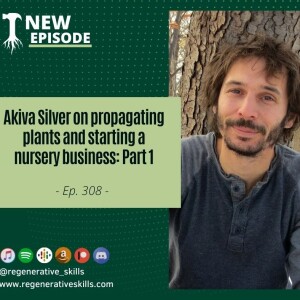
Friday Sep 01, 2023
Friday Sep 01, 2023
After the last few weeks of focus on the intricacies of Holistic management and building community in agriculture, I wanted to go back to some technical information on specific farming enterprises.
One of the most common questions I get asked from listeners and clients who are starting new projects is about where to begin. Those of you familiar with permaculture will know of the common advice to live and wait a full year on your site before beginning to design and implement your vision. This time of observation and information gathering can be essential to avoiding common mistakes and preparing your place and design adequately to begin, but it can be frustrating for many people who just want to get started. For that reason, one of the first projects I encourage people to do is to start a plant nursery. Not only will you start the long process of coaxing plants into maturity which is worth beginning as soon as possible, but you’ll also learn valuable plant care and propagation in the process. Planting your own nursery can also save you money when you eventually begin planting out your design, and if you enjoy it enough and can find a market for saplings and seedlings, you can make good money selling nursery stock as well. There are also real advantages to growing your plants in the soil and environment where they’ll live so they get the chance to acclimate rather than suffer a harsh adjustment from the heated greenhouse and chemical fertilisers so common in most plant nurseries.
In order to get a better understanding of just how easy and enjoyable it can be to start a nursery, I spoke with Akiva Silver who owns and operates Twisted Tree Farm, a homestead, nut orchard, and nursery located in Spencer, New York, where he grows around 20,000 trees per year using practices that go beyond organic. His background is in foraging, wilderness survival, and primitive skills. He has been observing nature intensively for the last 20 years, and cultivating a deep appreciation for life in that time.
This is a longer episode for this show and it’s packed with useful and practical information so I’ve split it into two episodes. This first one dives into how Akiva first began to propagate trees and his transition into making a business out of it and supporting his family by growing plants. We also get into all kinds of propagation methods and where and how to find the best materials for growing nursery stock. Next week I’ll conclude this interview by exploring how to build a business around growing the plants you love, improving your soil enough that you can eliminate fertilisers and other inputs, the maintenance and care of your nursery through the different seasons, and the sales and marketing side of the business.
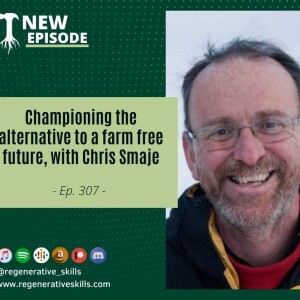
Friday Aug 25, 2023
Friday Aug 25, 2023
I’ve been watching an interesting and important discussion play out for a number of years now within the environmental movement and ecological farming community. It appears that on one hand we have a group that is convinced by the data that farming to feed a population which is growing exponentially through traditional land based means is doomed to be an ecological detriment. Our current system should instead be replaced with high tech solutions such as vertical farms and laboratory processes to create the nutrition this population needs. As a result we could return much of our farmland to rewilding efforts to recover the natural environments and biodiversity that we've lost, in no small part due to modern agriculture.
On the other side we have people who are convinced by the data (often the same data) that we need to return to a deeper and more compassionate relationship with the earth, one that allows for us to produce a yield without compromising the ability of all other life forms to exist and thrive. In this way we can both feed the population and restore our role as environmental stewards. Rather than returning many farms to rewild, we could incorporate habitat and biodiversity into our production methods and foster the recovery of wild species in a way that enhances the resilience of our production methods.
Instead of isolating human activity from a pristine concept of the natural world and permitting destructive actions in the remaining space, we could consider all of our necessary functions within a globally connected landscape for their potential to enhance all forms of life, not just our own. These two contrasting world views recently came to head during a debate between Allan Savory and George Monbiot. Allan represented the side of holistic management, taking into account the infinite complexity of the natural world to create management frameworks to operate with this nuance in a way that respects all the cycles and life affirming principles of our world.
George has been an outspoken critic of this position, especially in how it relates to the management of livestock in farming, arguing that there is no potential for beneficial ecological outcomes in livestock farming, and that in order to combat the climate crisis and mass biodiversity loss, high efficiency farming must be leveraged, along with technologies such as precision fermentation, to produce plant based protein alternatives to meat.
I’ve linked to the video recording of the debate in the show notes for this episode on the website, in order to let you make up your own mind about which side you support. I also want to express that I don’t consider these two positions, certainly not in their rigidity, as the only positions in the broader discussion. At the same time I know that anyone who has listened to more than a few episodes of this show will know which direction I lean personally. That brings me to today's interview in which I’ll be speaking with Chris Smaje. Chris is a university-based social scientist turned farmer. Has co-run a small farm and market garden for the last 20 years. Along with farming he is a dedicated voice for regenerative and locally based food systems. He's the author of 'A Small Farm Future' which articulates his vision and the details of a society built around local economies and food systems, and his most recent title, 'Saying NO to a Farm-Free Future directly confronts the popular arguments in favor of manufactured food and removing food production from the land.
In our conversation we start by identifying the sources and advocacy of industrially produced food and farm alternatives. We break down the manipulation of data and reductionist thinking that results in conclusions that technological fixes are our only solutions.
Chris also paints a picture of his ideas for a brighter alternative to these conclusions and what is possible in a more locally based and decentralized configuration of our sources of sustenance.
We also dig into the active role that all of us can play in creating this alternative future and accelerate a transformation in the role of farming as well as supply and production of food to one that serves the broader community of life that we’re all connected to.
This is one of my current favorite subjects of exploration as it is connected to so many aspects of how we live, organize ourselves, co-create culture and community, and manifest our future. I hope to explore aspects of this with many more people and perspectives in the coming months, so please, if there are people that you would like to hear me interview about these topics or if you’d like to add or challenge any of the points in the upcoming discussion, I encourage you to reach out on our discord community or to me directly at info@regenerativeskills.com
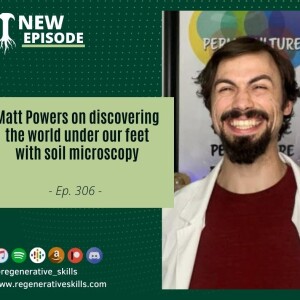
Friday Aug 18, 2023
Friday Aug 18, 2023
One of the emerging practices in the regenerative work space is that of citizen science. This covers an infinite range of scientific specialties, but I’ve especially seen amazing things come from two areas in the last couple years. These would be mycology and the study of soil. That isn’t to say that traditional institutions aren’t making advances in these fields, but passionate amateurs have also been leading some incredible innovations in these areas. Incredibly, at the center of both of these movements I regularly find my good friend Matt Powers, the author of many well known volumes including the Permaculture Student volumes one and two, Unstoppable Enthusiasm, and now even volumes for children including the newest, The Forgotten Food Forest which can all be found on his website along with many online courses at thepermaculturestudent.com
But of course today, we’ll be focusing on the cutting edge of soil science and how these new discoveries can help you in a very practical way to improve the health of the soil on your land and grow the highest quality food anywhere.
As a follow up on the last interview we did together about his epic text book of a volume, Regenerative Soil, comes the next volume that illuminates the study of soil called Regenerative Soil Microscopy. Having read the first book is a necessary prerequisite for this volume, which goes into best practices and key observations that aspiring soil scientists and anyone who wants to know what is going on in the food web under their feet can use to tap into a world of learning through their microscope.
As is typical of my conversations with Matt, the topics range wildly from selecting the best equipment for building your microscope lab, and ensuring you don’t go blind over time, to the way that this information has helped him advise farmers all over the world to achieve amazing crop results, to fascinating conversations he’s had with leading scientists in the field and much more.
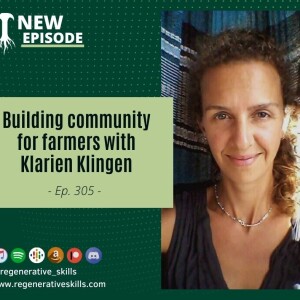
Friday Aug 11, 2023
Friday Aug 11, 2023
Since last year much of my work with Climate Farmers has been in building the European farmer community and creating connections so that members can learn from each other.
I admittedly don’t have a lot of prior experience with this so I went looking for experienced and successful community builders to mentor me in the process.
One of the most helpful and inspiring people the this search put me in touch with is Klarien Klingen, one of the primary organizers of the Dutch agroecological community called Toekomstboeren which translates to future farmers and works to strengthen the connection and representation of ecological farmers in their country.
They’ve made commendable progress in advancing awareness of their community and hosting events that connect farmers around their country in the process. Both of which are things I aspire to do with the Climate Farmers community.
In this conversation, Klarien and I explore her own background as a farmer and what has motivated her to unite others around her. We also look into what is behind the growth and success of Toekomstboeren as well as the collaborations and alliances that have strengthened their efforts.
I have found the information and experience I’ve gained from my consultations with Klarien to be quite universal beyond just the particularities of the farming community. Her observations and learnings ring true for many of the other community efforts and unification projects I’ve observed and been a part of.
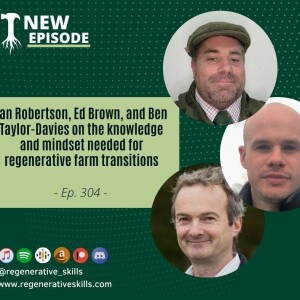
Friday Aug 04, 2023
Friday Aug 04, 2023
I’ve touched on this topic briefly in previous interviews, but it bears repeating. Agriculture around the world is going through a critical moment. The skyrocketing prices of petroleum products, meaning most agriculture chemicals and fertilizers as well as machinery fuel, is causing a tipping point for many farm businesses. Operations that have long been dependent on these synthetic inputs are facing tough decisions. Do they double down and continue to keep their land on life support, sticking with the system they know, but which is becoming more and more unsustainable, or do they take a gamble on new management methods that prioritize soil biology and multiple ecosystem services?
There are no easy answers since for most growers who’ve relied on these inputs for years if not decades, there will need to be a period of transition, even if they chose regenerative management, in which their yields could suffer.
Luckily, there are a few well qualified professionals out there with a track record of guiding farmers through the challenge of transitioning their land management practices, and I had the chance to speak to three of them in a special panel discussion. In today’s session I’ll be speaking with Ian Robertson, Ben Taylor-Davies, and Ed Brown. Between these three fellas they have decades of experience at the forefront of regenerative agriculture, and continue to push the advancement of agroecological innovation at both the individual farm scale as well as the institutional level.
All three of these guys are good friends who attest to speaking to one another just about every day and you’ll hear the characteristics of their friendship come out in this insightful and also light hearted discussion.
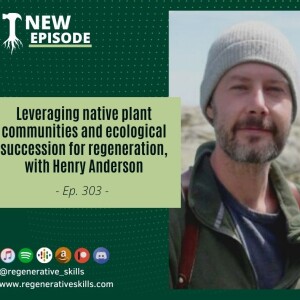
Friday Jul 28, 2023
Friday Jul 28, 2023
One of my favorite topics to explore on this show is how other people with unique skill sets and talents look at the natural world and the ecological design process. I’ve been fortunate in my network of designers, educators, farmers, and academics to peer into the specialties of ecological understanding and design thinking from many points of view, and today is one of those opportunities.
I first met Henry Anderson through a design project that our mutual friend Juan Pablo was working on in Portugal through the Climate Farmers Pioneer program. We were looking at a feasibility test for a 50 hectare plot that some investors were considering as an investment in regenerative agriculture. Juan Pablo introduced me to Henry as a colleague who would look into all the potential for leveraging native plant communities for ecological restoration and high value crops. I was immediately impressed by Henry’s extensive knowledge of biomes and plant communities in Portugal and together we all developed a really elegant mixed agroforestry design for the clients.
Long story short, the investment wasn’t picked up, but all three of us have been good friends ever since and now I’ve got Henry back to share some of his knowledge and experience as a biologist and designer. Henry is a Scottish multi-disciplinary designer based in Lisbon, Portugal with a background in landscape architecture, urban design and ecological planning. He has accumulated over fourteen years of professional experience working for leading architectural and landscape offices around the world, including in Australia, the Netherlands, Germany, United Kingdom and Portugal. Henry now specializes in delivering best practice regenerative solutions for landscape architecture, agriculture and ecological restoration projects within the Mediterranean biome, and follows an ecology led process that delivers multi-functional outcomes specific to each project's unique context.
In this conversation we talk at length about the process by which Henry starts to assess and investigate the state of ecological health and identify the plant and wildlife on a site, essentially his form of reading a landscape. We also look at the tools and resources that can expand the research process and give insights into historical land use and plant communities to open up more options for a design.
Together we also dissect the concept of natural succession and how you can leverage this trajectory to enhance and speed up the development of your project, and a lot more as well.
For those of you who love the deeper science of ecology and biology, but find the academic approach to it a bit too disconnected, this is the interview for you since Henry has a unique way of explaining and making connections between the abstract concepts and real life applications.









